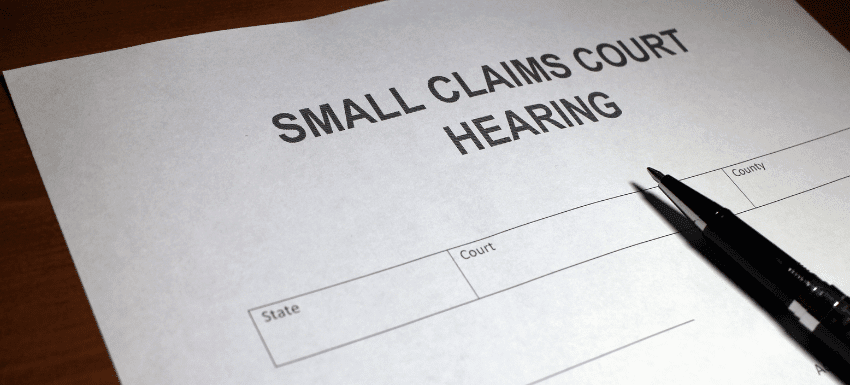
If you and someone else are having a disagreement and are unable to resolve it amicably, you may have to go to court to enforce your rights. The Small Claims Court in Ontario has the authority to award damages of up to $25,000 or to seek the return of property worth less than $25,000 in value.
A faster and more efficient resolution of cases, less formal procedural regulations, and the ability to represent oneself are just a few of the many advantages of filing a lawsuit in Small Claims Court rather than the Superior Court of Justice.
Should You Go To A Small Claims Court?

Someone owes you money, has wounded you, or has damaged your property, and you need to go to court. How can you decide if your complaint belongs in Small Claims Court? The right court to go to relies on a number of factors, including the amount at risk and the nature of your claim.
Consider The Dollar Value Of Your Claim
Suits can be filed in the Supreme Court, Provincial Court, or Civil Resolution Tribunal in Canada. Provincial Court’s civil law branch is known as Small Claims Court. The location of your case is determined by the dollar amount of your claim:
- The Civil Resolution Tribunal handles most disputes worth less than $5,000. (though there are exceptions depending on the complexity and subject matter of your claim).
- You can suit in Small Claims Court if your claim is worth between $5,000 and $35,000.
- In the Provincial Supreme Court, you can file a claim for any amount of money. In general, claims totaling more than $35,000 should be filed in the Ontario Supreme Court. This is because a successful plaintiff may incur costs if their suit is settled for a financial sum that falls within the Small Claims jurisdiction.
While the Small Claims Court’s jurisdiction has defined monetary boundaries, there are other factors to consider when deciding where to file your complaint. In some situations, for example, it may be more advantageous to voluntarily surrender the component of the claim that exceeds $35,000 so that you can file your claim in the Small Claims Court, which is supposed to be less time-consuming and less expensive than the Supreme Court litigation. Because each case is different, the best course of action is to get legal or paralegal counsel.
Small Claims Court Can Only Hear Certain Types Of Claims
The Small Claims Court has “limited jurisdiction,” which means it can only deal with particular types of civil law issues. The Small Disputes Court has jurisdiction over claims involving debt, damages, personal property recovery, and certain types of contracts. Other claims, regardless of the cash worth at risk, must be presented in Supreme Court, such as:
- Claims involving an interest in land (real property);
- Claims involving wills and estates;
- Applications for an order for divorce;
- Actions in defamation, whether libel and slander;
- Malicious prosecution claims;
- Claims against the federal government; and
- Most builders’ lien claims.
If you’re planning to file a claim in Small Claims Court, here are seven pointers to help you get started.
1) Having no standing
This may sound self-evident, but the first question you should ask yourself before taking any action is, “Am I allowed to do this?” It is critical to determine whether or not you have standing. If a party can show the court that he or she has a sufficient relationship to the case and the alleged injury, that party has standing. Take a look at the sample below to see what I mean.
Alex and Lucy have been married for a long time. On October 30, 2016, Lucy lent $15,000 to a friend, Charles. She drew the money from her own personal bank account. Charles agreed to repay the debt by the end of the next year. It is currently after the 30th of October, 2017. Lucy has phoned Charles several times to check about the loan’s repayment. Charles keeps dodging her calls because he does not yet have the financial ability to repay her. Alex and Lucy decide to sue Charles for the money owed in Small Claims Court.
While Lucy may have a case against Charles, Alex is not in the same boat. Alex is not automatically a proper plaintiff just because he and Lucy are married. Because Lucy withdrew the money out of her own account and because the arrangement was strictly between Lucy and Charles, Alex has no link to this litigation. As a result, Alex has no legal standing in this case.
A defendant may seek and receive costs against a party who is ineffectively named as a plaintiff in an action if the right plaintiff is not mentioned.
2) Naming the wrong defendant
One of the most typical blunders is miswriting the names of the parties to the litigation. If you’re suing a corporation, keep in mind that it can be doing business under a different name than its legal name. To determine the corporation’s entire legal name, you may need to obtain a company name report. You may be bringing an action against a corporation that has nothing to do with your disagreement if you neglect to designate the correct business in your pleadings. This could lead to your action being dismissed right away.
Also, keep in mind that, for the purposes of an action, a corporation is a separate person from its directors and officers. If directors or officers operate outside the extent of their responsibilities, they may be personally liable for your loss in some situations. In that instance, your claim should include both their names and the company’s name. Keep in mind, however, the first blunder highlighted in this article: do not add directors and executives as defendants haphazardly.
3) Not keeping track of dates and deadlines

If you’re considering filing a lawsuit, don’t put off dealing with your problem; otherwise, it may be too late. The standard time to bring an action against someone in Ontario is two years from the date of the wrongdoing, according to the Limitations Act, 2002.
Take, for example, the preceding example. Lucy’s case would be statute-barred if she had lent money to Charles on October 30, 2015, and waited until after October 30, 2017, to sue him.
If you’re being sued, you’ll need to keep track of the various stages of the legal process. You have twenty calendar days from the date you were served with pleadings to give the plaintiff a copy of your defense and file it with the court.
If the twentieth day falls on a weekend or a statutory holiday, you have until the next working day to serve and file your defense. If you fail to file your pleadings on time, you may be marked in default. This means you won’t be able to file a defense and won’t be able to get a copy of any additional pleadings in the case. As a result, the plaintiff could file a lawsuit against you for the full amount of the claim without informing you.
4) Not having any relevant evidence
Evidence is the foundation of each litigation; without it, there is no case. It is your responsibility as the plaintiff to furnish the court with the information necessary to substantiate your claim.
When gathering evidence to support your allegations, written agreements, e-mails, text messages, receipts, photographs, and videos are usually a good place to start.
When compiling evidence, keep in mind that quality beats quantity. Bringing a stack of papers into a trial may frighten the opposing party, but the facts you’ve gathered may not prove anything. Ask yourself the following questions while you’re looking at a piece of evidence:
- How is this relevant to my case?
- Is this piece of information reliable?
- Is my source of information objective?
- How is this information supporting my position on this case?
While the burden of proof does not fall on you if you are defending an action, you should always be prepared to refute the plaintiff’s assertions. As a result, take the time to gather your own data and ask yourself the above-mentioned questions.
5) Refusing to settle

Every story is considered to have three sides: the plaintiff’s version of events, the defendant’s version of events, and ultimately, whatever the judge decides! While our legislators have passed a myriad of statutes, regulations, and by-laws to guarantee that the judicial system is fair and equal, judgments can often appear to be unfair.
Even if there appears to be a “winning case,” it is always a good idea to try to settle the disagreement before going to trial. Those involved in legal processes are prone to becoming engrossed in the prospect of going to trial. “It’s not about the money, it’s a question of principle!” lawyers and paralegals frequently hear.
Let’s face it: if you’re in court for anything other than a money or property issue, you’re wasting your time (and money for that matter). Rather than waiting for a judge to rule on your case, take matters into your own hands and reach an agreement with the other side to bring the issue to a close, even if it means lowering your expectations. You will be able to progress to better things as a result of this.
6) Expecting the wrong remedy
In Small Claims Court, there are no remedies other than money or the restoration of property. For a single claim, the plaintiff will be awarded a maximum of $25,000 in damages. The plaintiff might also seek that any agreed-upon interest is applied to the damages claimed, or that the interest rate set forth in the Courts of Justice Act (usually around 2%) be applied.
If you’re litigating in Small Claims Court, you won’t be able to get the following orders:
- Taking down a negative review from a website;
- Releasing confidential documents;
- Freezing assets;
- Moving a fence; and
- Not playing loud music at night.
7) Not getting independent legal advice

One of the advantages of filing a lawsuit in Small Claims Court is the freedom to represent yourself. This can be a viable choice for persons with little resources or for claims with a small amount at stake. Obtaining legal counsel from a lawyer or a paralegal to evaluate your rights and obligations is always a good idea, regardless of the amount of the claim or the complexity of the situation.
You should also speak with a lawyer or a paralegal to gain a better grasp of the Small Claims Court process and to ensure that you are taking all required precautions to safeguard your rights. It’s just that if there’s anything you should be doing.
Move Forward With AG Group!
Sometimes it is difficult to know which court to take your disputes to. People often mix up cases between the Provincial Supreme Court and Small Claims Court. In order to make it easier, hire a professional paralegal from AG Group Enterprise Inc professional paralegals. Our paralegals will work day and night to make sure your case in small court is settled as soon as possible with favorable outcomes.
In order to quickly settle your dispute, hire AG Group Enterprise Inc. We have been providing paralegal services for over a decade and have the skills and knowledge required to help you through the ordeal.
If you want to know whether your legal dispute is right for small claims, paralegals at AG Group are here to review your case and discuss your options. Contact us today for advice on the most effective way to resolve your legal dispute.



